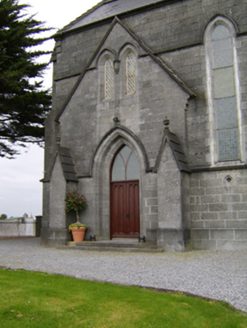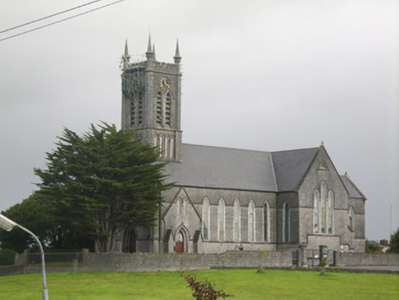Survey Data
Reg No
30333049
Rating
Regional
Categories of Special Interest
Architectural, Artistic, Historical, Social
Previous Name
Saint John's Church (Kilcloony)
Original Use
Church/chapel
In Use As
Church/chapel
Date
1840 - 1845
Coordinates
185119, 231081
Date Recorded
04/09/2009
Date Updated
--/--/--
Description
Freestanding cruciform-plan Church of Ireland church, built 1842-3, and rebuilt following fire in 1899. Six-bay nave elevation, having gabled slight advances with entrances to west end of both nave elevations, full-height transepts, lower chancel, and with square-plan tower to west (entrance) end. Pitched slate roofs having cast-iron rainwater goods, cut limestone copings and cross finials. Cut-stone crenellated parapet to tower with carved spired pinnacles set on corner buttresses, and with clock faces to top stage. Ashlar limestone walls with cut-stone string courses. Lancet window openings throughout, triple to gables, east window having double centre light, with chamfered surrounds and cut-stone hood-mouldings, having stained glass. Lancet openings to tower, paired and with cut-stone louvres to upper stage, and in fours to lower stage. Triangular lights to upper part of transept and east gables. Pointed Order Arch doorway to west gable having hood-moulding continued by moulded string course, and having carved timber double-leaf door with pointed arch detailing, Y-tracery overlight and cut-stone steps, and flanked by widely spaced pointed windows. Pointed arch doorway to south elevation having chamfered surround and hood-moulding, cut-stone steps and flanked by gabled buttresses with stepped plinths and urn finials, and having carved timber double-leaf door. Grounds bounded by rubble limestone walls, perimeter to south having cast-iron double-leaf gate with chamfered square-profile piers, in turn flanked by square-headed pedestrian openings with cast-iron pedestrian gates. Cast-iron railings on plinth wall to west.
Appraisal
Located in a dominant position in the town, this church remains an impressive landmark, all the more so because of the substantial fair green at its foot. Originally designed by Joseph Welland, it was rebuilt subsequent to a fire in 1899. it is an interesting composition, with simple forms and restrained decoration, the coursed cut limestone masonry being evidence of the wealth and prosperity in Ballinasloe at the turn of the century, as well as the obvious skill of its masons.



